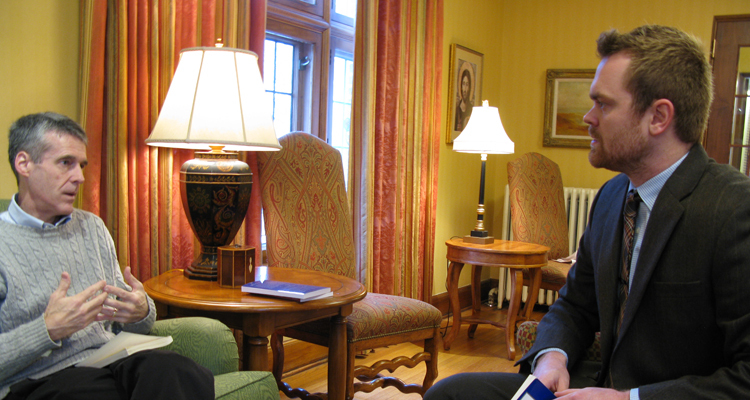As Pope Benedict XVI tells us in Deus Caritas Est, being a Christian is not the result of a lofty idea but instead comes after an encounter with a person. Logical proofs of God’s existence are no replacement for a relationship with his son.
But does this mean that Catholic studies should replace its courses with compulsory Holy Hours or service projects? Asked another way, does the intellectual life contribute anything to the spiritual life?
If my own experience is any indication, ideas have been essential to a fuller practice of the faith and a deeper relationship with Christ. In particular, the concept of “the Christian distinction” that I encountered my first fall as a CSMA student has impacted me profoundly.
Articulated by Robert Sokolowski in his book, The God of Faith and Reason, the Christian distinction underscored for me the utter transcendence of God. My engagement with this concept allowed a theological fact, which I had been reciting for years, to finally sink into my intellect as a truth of reality.
In doing so, it transformed who I understand God to be – and, therefore, how I relate to him as my father and savior. It hasn’t happened overnight, but I now can see how this mere “idea” has contributed to a deeper and more authentic love for God, especially in my prayer.
Wanting to dig deeper into this connection between faith and reason, knowing and loving, I recently sat down with Dr. David Foote, the professor who introduced me to “the Christian distinction” in his fall 2014 Catholic Thought and Culture course. An edited transcript of our discussion follows.
Liedl: Some people have difficulty seeing how talking and thinking about God is relevant to actually loving and serving him. How does intellectual inquiry play into the spiritual life?
Foote: Christianity is always something that’s first lived, but it’s important to be able to stop, reflect and articulate what you’re experiencing. If you don’t, it’s easy to end up in error, since there are all kinds of ways your inclinations can go wrong.
Articulation gives you direction and power in the spiritual life. Being able to name something makes it more palpable. It helps theological concepts thread themselves into lived reality. We can see how this is relevant to something like the Eucharist. As a starting point, you need to participate in it. But the more you can articulate what is taking place, the more power it will have in your life.
Why is “the Christian distinction” such an important idea?
Keeping the distinction between God and creation is important, because if we lose a sense of that distinction, we are likely to either collapse nature into grace or to allow nature to swallow up grace. And we can see how these tendencies play out today with both fundamentalism and theological liberalism. The latter tends to diminish the mystery of God working in our hearts, reducing religion to some form of ethics. The former tends to diminish human responsibility and honesty about the many ways we confuse grace with ego.
Some might say that emphasizing God’s transcendence can make the faith into an abstraction. But how can properly understanding the radical “otherness” of God lead us to a more loving and intimate relationship with him?
The more we realize that God is not a being in the world, the biggest thing in creation, the more we realize that God’s relation with us and with creation is noncompetitive. It’s no longer the case that if he’s big, we have to be small, or that he’s imposing outside restrictions on us and limiting our freedom. Instead, we begin to see how God’s commands are the very words that create us. To live in accordance with God’s commands doesn’t restrain or diminish us – it’s to live in accordance with an internal principle that defines everything I’m made for. It’s not the case that I am nothing in relation to God, but that I am nothing without God.
Another important corollary of God’s transcendence is the non-necessity of the world. God has no need of us or creation. At first, it may sound demeaning to say that God does not need us. In reality it means that God created us out of sheer delight. God’s actions in the world – from creation itself to the atonement – are acts of unimaginable generosity and love. And we are the objects of this generosity and love. Even our efforts to love him back are gifts, allowing us to participate in his creative love. So a fuller understanding of God’s transcendence actually helps transform our love and gratitude into something even more profound.
This is all great ... but it seems like being a Christian involves a lot of thinking! Does everyone who wants to be a good Christian have to read Sokolowski’s book?
Well someone has to read it! But different people have a wide variety of gifts to express and articulate truths in different ways. Look at someone like Bishop Robert Barron and his “Word on Fire” videos. He’s deeply influenced by Sokolowski, and it’s evident when he talks about nature and grace. So if you listen to him enough, you’ve sort of read Sokolowski.
In articulating the life of grace, writers like Sokolowski can help us imagine and live out God’s generous, non-competitive relation to the world in that particular place and time we find ourselves and with the particular gifts and aptitudes he has given us. In short, they help us live the incarnation inculture.







